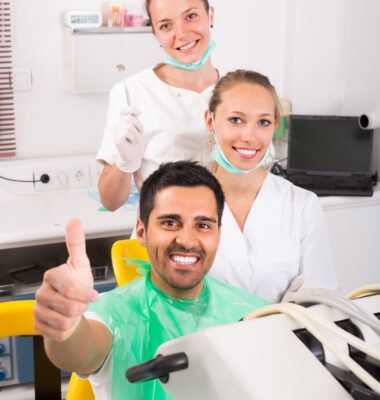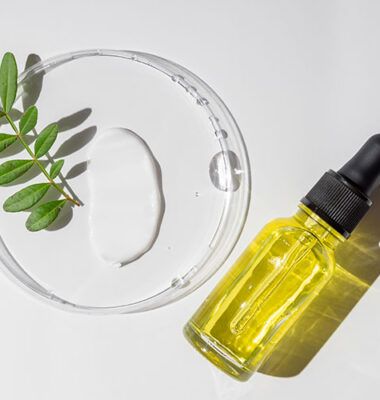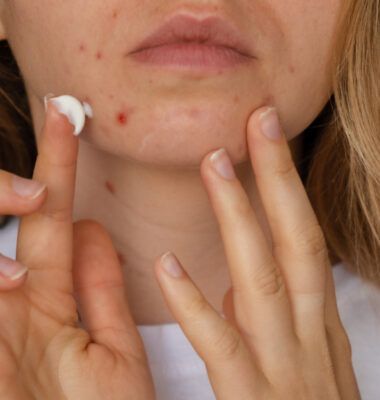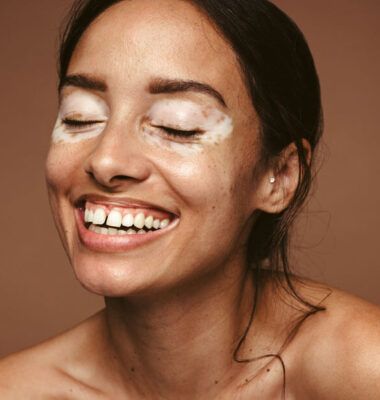Pregnancy-Safe Skincare: What to Avoid During Pregnancy
Fact checked
By Andrea Pinto Lopez, MD | General Practitioner
Last Updated on November 23rd, 2023 / Published on October 20, 2023
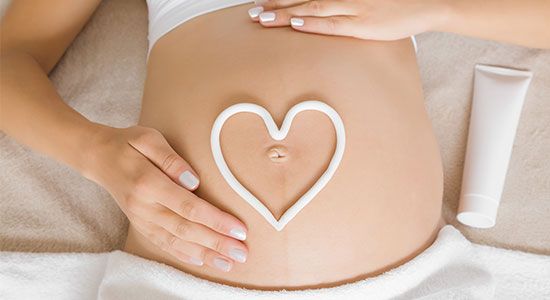
When you’re expecting, pregnancy-safe skincare becomes incredibly important. During pregnancy, your skin might change in ways you didn’t expect, like getting acne, stretch marks, or dry and sensitive skin. Navigating these changes can be both overwhelming and emotional.
It’s very important to choose skincare products that are safe for both you and your baby. Some skincare ingredients are contraindicated during pregnancy, but there are also many great choices for pregnant skincare. But with so many options available, deciding on the best one can be tricky.
In this article, we will guide you through selecting a safe and effective pregnant skincare that can protect both mom and baby. Let’s dive in to learn more.
Why Skincare Matters During Pregnancy: Here’s What Happens to Your Skin
Progesterone and estrogen are the main pregnancy hormones, and they’re responsible for many of the changes to your skin.
Other factors, such as sun exposure and pre-existing skin conditions, also influence your skin health.
Pregnancy does the following to your body:
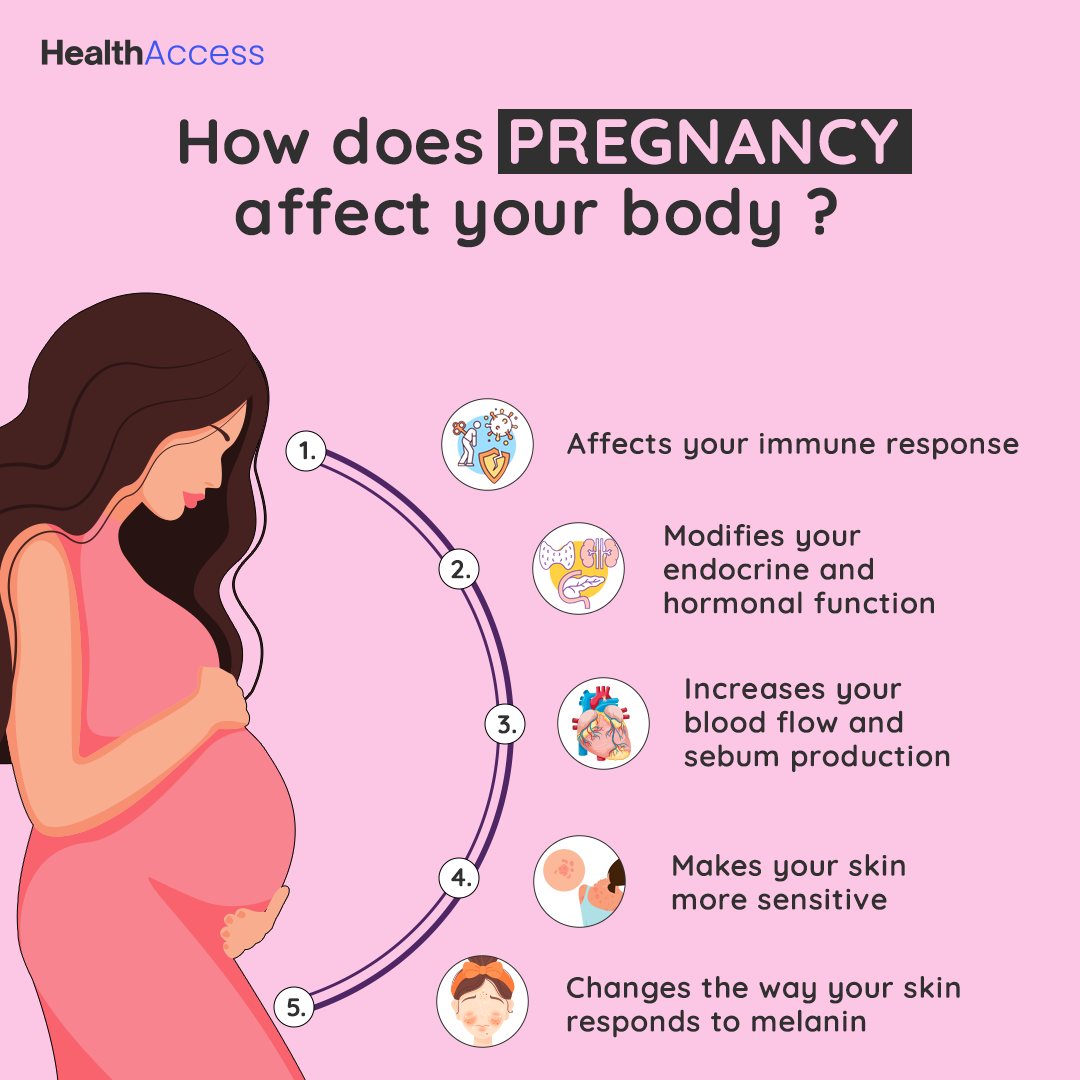
- affects your immune response
- modifies your endocrine and hormonal function
- increases your blood flow and sebum production
- makes your skin more sensitive
- changes the way your skin responds to melanin
It’s helpful to know that every pregnancy is different, and it’s impossible to predict how your skin will change.
Some women have glowy, spotless skin during pregnancy. However, scientists have estimated that up to 90% of women1 experience significant changes in their skin in pregnancy. So you’re not alone if you feel like your skin has changed a lot since you got pregnant!
Now, let’s look at some issues that can affect skin in pregnancy.
8 Common Pregnancy Skin Issues You May Experience
Acne
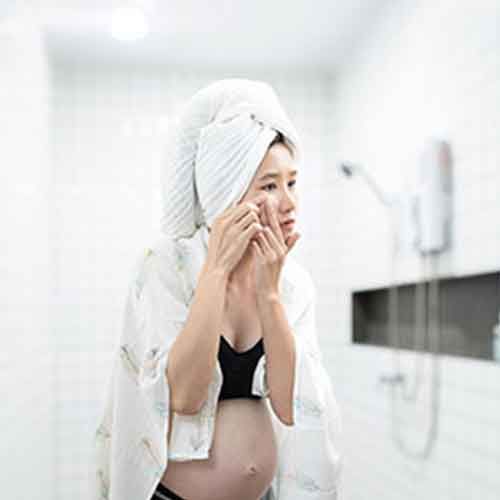
Pimples and breakouts are some of the most common skin issues during pregnancy. Around 40% of pregnant women2 experience pregnancy acne.
Increased oil production can clog your pores, which leads to pregnant skin breaking out. Pregnancy acne is more common in women who have had acne before.
Dark spots
Hyperpigmentation is caused by estrogen, progesterone, and melanocyte-stimulating hormone (MSH), which act together to increase melanin deposits3 in your skin. Darkened skin during pregnancy can affect different body parts, including:
- Nipples
- Areola
- External genitals
- Thighs
- Pre-existing freckles
- Recent scars
You may also develop a sign called linea nigra,4 which is a dark vertical line that can appear between your belly button and pubic bone.
Up to 80% of pregnant women4 experience a darkened linea nigra in the second trimester, which normally fades during the postpartum period. The linea nigra is not a cause for concern about your or your baby’s health.
Melasma
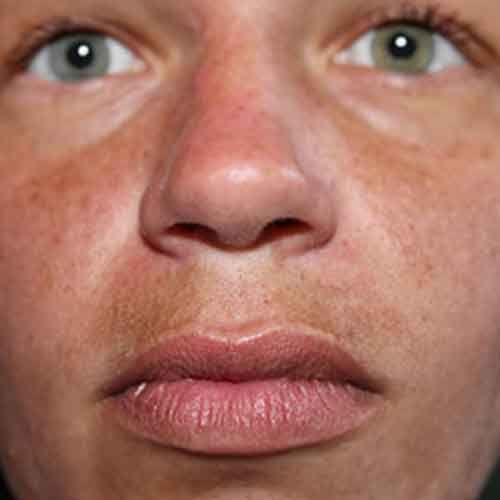
This sign is also related to hyperpigmentation, and it’s commonly referred to as the “mask of pregnancy.” Melasma can affect anyone, but pregnancy is one of its most common triggers.
In melasma,5 brown or grayish patches appear on the face, especially on the forehead, cheeks, chin, and nose bridge.
Hair growth

Pregnancy hormones increase hair growth, slow hair loss,6 and thicken hair strands. Some women have luscious, thick hair for a few months during pregnancy.
Normal hair loss resumes during the postpartum period, so you can expect to see some increased shedding after delivery. This is known as telogen effluvium, and it’s completely normal!
Hair growth during pregnancy can affect other parts of your body. Some women notice thicker hair on their face, neck, underarms, abdomen, and bikini lines. But on the bright side, this extra hair will also go away within 3-6 months of delivery.
Sensitive skin

As your baby grows, your skin stretches and adapts to your expanding belly. Your skin may feel more sensitive, and you can experience pregnancy skin rashes. Some women have dry skin during pregnancy, which can worsen sensitivity.
Additionally, your immune system is working hard7 during pregnancy to protect you from infections. This can increase reactions to substances like dust, soaps, detergents, and perfumes. You may find yourself dealing with itchy skin when pregnant, even if you’ve never had allergies.
Pregnancy hormones can also worsen pre-existing skin conditions, such as eczema, dermatitis, or rosacea.
Skin tags
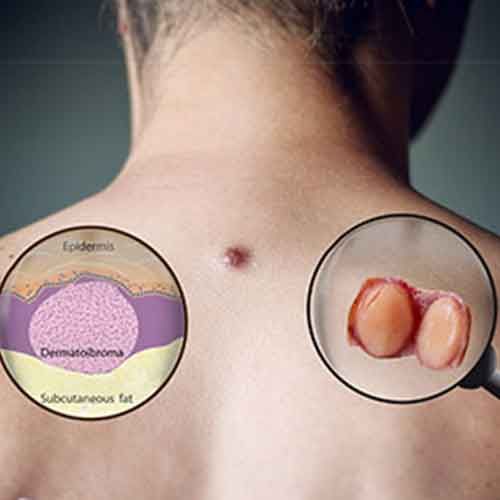
Soft-tissue fibromas, commonly known as skin tags, are small skin growths common in late pregnancy. These growths are benign and tend to appear in skin folds, such as underarms, neck, and under your breasts.
Skin tags can be associated with weight gain and hormone changes during pregnancy, and they often disappear after childbirth.
Varicose veins
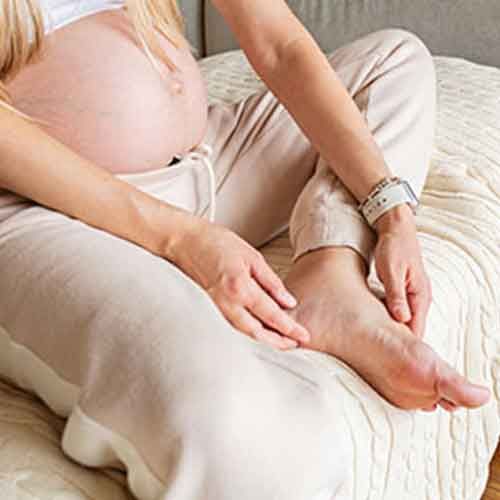
Varicose veins develop when blood pools in some part of your body. They’re common in pregnancy,8, especially around the legs, genitals, and ankles. Varicose veins can look like lumpy ropes under your skin.
Varicose veins happen because your belly puts pressure on the blood vessels in your pelvis, affecting your blood flow.
Stretch marks
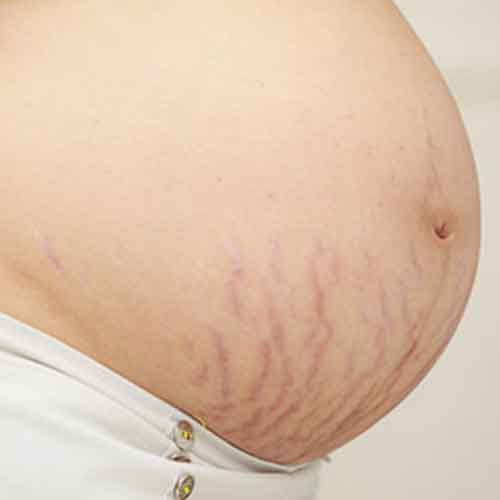
Stretch marks appear when the tissues in your skin suffer partial ruptures,9 creating thin streaks that can look reddish, bluish, or white. Stretch marks affect 90% of women during the third trimester.
Although stretch marks can develop at any point in our lives, they’re more frequent during pregnancy due to hormonal changes.
Harmful Ingredients in Skincare Products for Pregnant Women and Why They Are Not Safe
Retinoids

Retinoids are a form of vitamin A used to prevent fine lines and treat skin conditions. However, they’re also among the main pregnant skincare ingredients to avoid since research shows they cause congenital birth defects.
There are oral and topical retinoids available, and while the absorption rate of topical retinoids is much lower, they’re still not recommended during pregnancy.10 You should inform your healthcare provider if you were taking oral retinoids when you got pregnant.
Retinoids can include retinol, isotretinoin, tretinoin, adapalene, tazarotene, and bexarotene.
High-dose salicylic acid
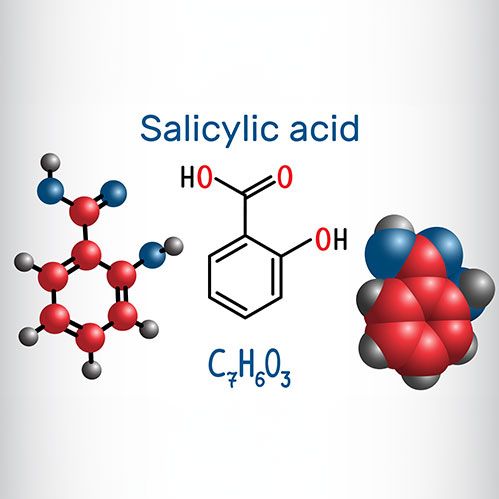
Salicylic acid is used as a peeling skincare ingredient. Low doses of salicylic acid are considered safe11 when used for a limited time. But higher doses of salicylic acid, such as the ones used in professional peels, aren’t recommended during pregnancy, even if the risk of absorption is low.
Hydroquinone
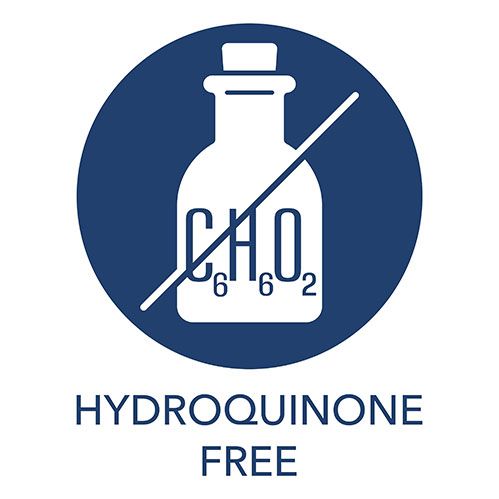
Hydroquinone is used to lighten hyperpigmentation. Unlike other skincare ingredients, topical hydroquinone is absorbed12 in high quantities through the skin, so it’s considered an unsafe skincare ingredient in pregnancy.
Phthalates

Phthalates are chemicals that can disrupt your endocrine function, and you can find them in many skincare products and their containers.
These chemicals aren’t just harmful during pregnancy. Evidence shows that13 they could even have a long-term impact on pregnancy success, child development, and reproductive health. As a result, they’re not considered to be safe skincare products during pregnancy and beyond.
Formaldehyde
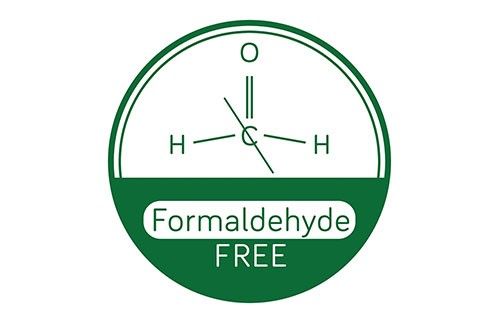
Formaldehyde is sometimes used as a preservative in skincare products, but scientists have linked it14 to increased abortion or miscarriage risk, congenital defects, and preterm birth.
Certain skincare ingredients can release formaldehyde over time, including bronopol, DMDM hydantoin, hydroxymethyl glycinate, methylene glycol, diazolidinyl urea, quaternium-15, and 3-dioxane.
Parabens
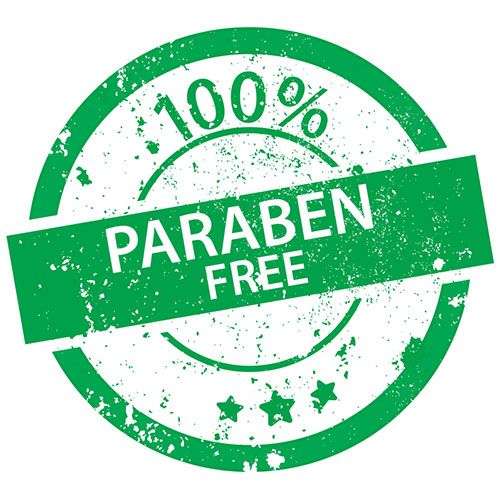
Parabens are also used as preservatives in skincare. Some studies show15 that maternal paraben use could increase a child’s risk of becoming overweight in the future. More research is still needed on this topic — but in the meantime, it’s safer to avoid certain skincare ingredients during pregnancy, such as parabens.
Chemical sunscreens
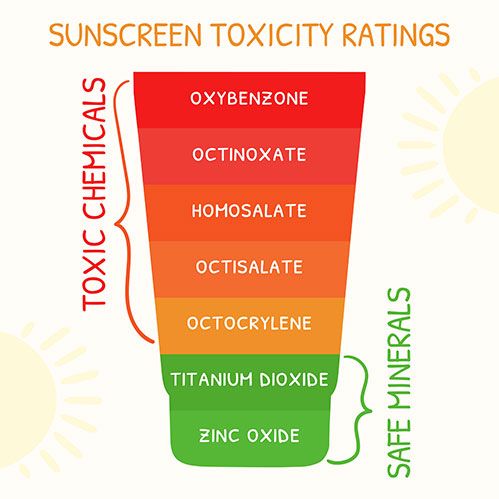
Oxybenzone is commonly found in chemical sunscreens, and it can act as a hormonal disruptor16 and affect the formation of mammary (breast) tissue during pregnancy and breastfeeding. Oxybenzone is also linked to Hirschsprung disease (HSCR), a congenital disorder that can cause intestinal blockage.
Our Recommended Pregnancy-Safe Skincare Products
After reading about all the skincare ingredients you should avoid during pregnancy, creating your pregnant skincare routine may seem impossible. But don’t worry! There are many products that expectant moms can safely use.
Here are some of our favorite pregnancy-safe skincare brands:
- The Honest Company
- La Roche-Posay
- Neutrogena
- The Ordinary
- Mama Mio
- Acnomel
- Hero Cosmetics
- Biossance
- Drunk Elephant
- Frida Mom
DIY Skincare Solutions
In addition to creating a pregnancy-safe skincare routine, there are some options for natural skincare during pregnancy. These DIY pregnant skincare solutions can help address common skin issues:
- Sugar and honey body exfoliating scrub
- Oatmeal, yogurt, and honey face mask
- Cucumber eye pads
- Green tea face toner
- Avocado or coconut oil hair mask
- Coconut oil, cocoa butter, or shea butter body moisturizer
- Aloe vera gel for irritation, pregnancy rash, or acne
Pregnancy-Specific Skincare Concerns
Skincare for Pregnancy Acne
Topical over-the-counter treatments that include glycolic acid, azelaic acid, erythromycin, clindamycin, and low-dose benzoyl peroxide are generally considered to be safe pregnancy acne solutions.
Laser and light therapies are also safe during pregnancy, but a professional should administer them.
To manage acne, you should also limit your sunlight exposure, use mineral sunscreen, and avoid picking or touching any pimples (we know this one can be hard!).
Handling Pregnancy-Related Rashes and Itching
Itching can be very frustrating, and it can be difficult to identify how to treat itchy skin when pregnant.
These natural pregnancy skin rash solutions can be very helpful:
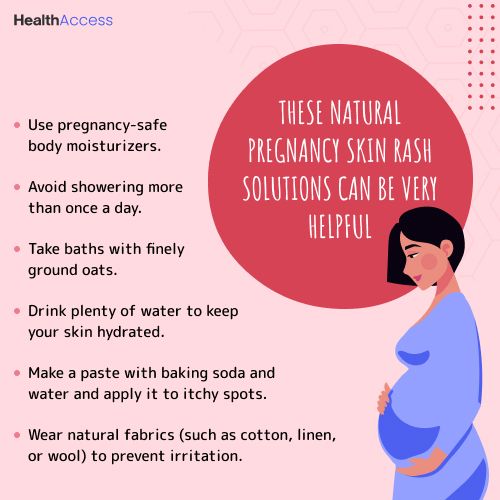
- Use pregnancy-safe body moisturizers.
- Wear natural fabrics (such as cotton, linen, or wool) to prevent irritation.
- Drink plenty of water to keep your skin hydrated.
- Avoid showering more than once a day.
- Make a paste with baking soda and water and apply it to itchy spots.
- Take baths with finely ground oats.
Dermatologist Recommendations
Your skincare routine can be a moment to pamper yourself and relax — which is very necessary during pregnancy!
If you have specific concerns and want to ensure that you’re following the best routine, it’s a good idea to seek a dermatologist’s advice for pregnant skincare. After all, pregnancy changes can be overwhelming, and listening to expert opinions on pregnancy skincare can be very reassuring.
While many skin changes are normal during pregnancy, we encourage you to seek medical attention if you have concerns about skin growths, moles, or other skin problems during pregnancy.
Pregnancy skincare FAQs
Can I use any skincare products during pregnancy?
Yes, absolutely! Many skincare ingredients, such as hyaluronic acid, niacinamide, vitamin C, azelaic acid, mineral sunscreen, and peptides, are safe during pregnancy.
How do I know which pregnant skincare products to choose?
Choosing the right products is one of the most common skincare questions during pregnancy. If you’re having doubts about your skincare routine, consult with your OB-GYN or dermatologist.
Takeaway
Pregnancy is a magical time, but it can be difficult to adjust to all the changes that your body has to go through. Skincare concerns are normal during pregnancy, and you can expect some skin changes to pop up during these months.
You must avoid some ingredients to keep your baby safe, especially retinoids. You may need to adjust your regular skincare routine during pregnancy, but there are still plenty of safe options to choose from.
And as a final thought on pregnancy-safe skincare: always remember — these changes are occurring because your body is working hard to grow your baby! Your healthcare provider can help you navigate these decisions while keeping your skin healthy.
Sources
- Vora RV, Gupta R, Mehta MJ, Chaudhari AH, Pilani AP, Patel N. Pregnancy and skin. J Family Med Prim Care. 2014;3(4):318-324.
- Awan SZ, Lu J. Management of severe acne during pregnancy: A case report and review of the literature. Int J Womens Dermatol. 2017;3(3):145-150. Published 2017 Jul 13.
- Motosko CC, Bieber AK, Pomeranz MK, Stein JA, Martires KJ. Physiologic changes of pregnancy: A review of the literature. Int J Womens Dermatol. 2017;3(4):219-224. Published 2017 Oct 21.
- Linea Nigra: Pregnancy line, causes & when does it go away. Linea Nigra. July 18, 2022.
- Basit H, Godse KV, Al Aboud AM. Melasma. [Updated 2023 Aug 8]. StatPearls. Treasure Island (FL): StatPearls Publishing; 2023 Jan.
- Grymowicz M, Rudnicka E, Podfigurna A, et al. Hormonal Effects on Hair Follicles. Int J Mol Sci. 2020;21(15):5342. Published 2020 Jul 28.
- Abu-Raya, B., Michalski, C., Sadarangani, M., & Lavoie, P. M. (2020). Maternal Immunological Adaptation During Normal Pregnancy. Frontiers in immunology, 11, 575197.
- Varicose veins during pregnancy: Types, causes & treatment. Cleveland Clinic. May 5, 2022. Accessed September 21, 2023.
- Stretch marks in pregnancy. NHS. November 25, 2022.
- Williams AL, Pace ND, DeSesso JM. Teratogen update: Topical use and third-generation retinoids. Birth Defects Res. 2020;112(15):1105-1114.
- Is any acne treatment safe to use during pregnancy? American Academy of Dermatology.
- Putra IB, Jusuf NK, Dewi NK. Skin Changes and Safety Profile of Topical Products During Pregnancy. J Clin Aesthet Dermatol. 2022;15(2):49-57.
- Wang Y, Qian H. Phthalates and Their Impacts on Human Health. Healthcare (Basel). 2021;9(5):603. Published 2021 May 18.
- Amiri A, Pryor E, Rice M, Downs CA, Turner-Henson A, Fanucchi MV. Formaldehyde exposure during pregnancy. MCN Am J Matern Child Nurs. 2015;40(3):180-185.
- Leppert B, Strunz S, Seiwert B, et al. Maternal paraben exposure triggers childhood overweight development. Nat Commun. 2020;11(1):561. Published 2020 Feb 11.
- Charlotte D LaPlante, Ruby Bansal, Karen A Dunphy, D Joseph Jerry, Laura N Vandenberg, Oxybenzone Alters Mammary Gland Morphology in Mice Exposed During Pregnancy and Lactation, Journal of the Endocrine Society, Volume 2, Issue 8, August 2018, Pages 903–921,


